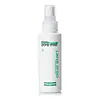What's inside
What's inside
 Key Ingredients
Key Ingredients

 Benefits
Benefits

 Concerns
Concerns

 Ingredients Side-by-side
Ingredients Side-by-side

Water
Skin ConditioningAloe Barbadensis Leaf Juice
Skin ConditioningPolysorbate 80
EmulsifyingHamamelis Virginiana Water
AstringentSodium Gluconate
Skin ConditioningSodium Lactate
BufferingBenzyl Alcohol
PerfumingPhenoxyethanol
PreservativeSorbitol
HumectantPanthenol
Skin ConditioningCananga Odorata Flower Oil
MaskingDisodium EDTA
Sodium Citrate
BufferingBenzoic Acid
MaskingCamellia Sinensis Leaf Extract
AntimicrobialBenzalkonium Chloride
AntimicrobialDehydroacetic Acid
PreservativeEthylhexylglycerin
Skin ConditioningCitric Acid
BufferingLinalool
PerfumingBenzyl Benzoate
AntimicrobialBenzyl Salicylate
PerfumingFarnesol
PerfumingGeraniol
PerfumingEugenol
PerfumingIsoeugenol
PerfumingWater, Aloe Barbadensis Leaf Juice, Polysorbate 80, Hamamelis Virginiana Water, Sodium Gluconate, Sodium Lactate, Benzyl Alcohol, Phenoxyethanol, Sorbitol, Panthenol, Cananga Odorata Flower Oil, Disodium EDTA, Sodium Citrate, Benzoic Acid, Camellia Sinensis Leaf Extract, Benzalkonium Chloride, Dehydroacetic Acid, Ethylhexylglycerin, Citric Acid, Linalool, Benzyl Benzoate, Benzyl Salicylate, Farnesol, Geraniol, Eugenol, Isoeugenol
Water
Skin ConditioningNiacinamide
SmoothingHamamelis Virginiana Extract
AntiseborrhoeicGlycerin
HumectantLactobacillus Ferment
Skin ConditioningButylene Glycol
HumectantLactobacillus
Skin ConditioningPolysorbate 20
EmulsifyingPanthenol
Skin ConditioningPotassium Sorbate
PreservativeCitric Acid
BufferingCocos Nucifera Fruit Extract
EmollientCamellia Oleifera Leaf Extract
AstringentChamomilla Recutita Flower Extract
MaskingRosa Canina Fruit Extract
AstringentHydrolyzed Hyaluronic Acid
HumectantSodium Hyaluronate
HumectantBenzoic Acid
MaskingHexyl Cinnamal
PerfumingLeuconostoc/Radish Root Ferment Filtrate
AntimicrobialBenzyl Salicylate
PerfumingCitronellol
PerfumingWater, Niacinamide, Hamamelis Virginiana Extract, Glycerin, Lactobacillus Ferment, Butylene Glycol, Lactobacillus, Polysorbate 20, Panthenol, Potassium Sorbate, Citric Acid, Cocos Nucifera Fruit Extract, Camellia Oleifera Leaf Extract, Chamomilla Recutita Flower Extract, Rosa Canina Fruit Extract, Hydrolyzed Hyaluronic Acid, Sodium Hyaluronate, Benzoic Acid, Hexyl Cinnamal, Leuconostoc/Radish Root Ferment Filtrate, Benzyl Salicylate, Citronellol
 Reviews
Reviews

Ingredients Explained
These ingredients are found in both products.
Ingredients higher up in an ingredient list are typically present in a larger amount.
Benzoic Acid is used to preserve and adjust the pH of products.
The antimicrobial property of Benzoic Acid helps elongate a product's shelf life. Its main role is to reduce fungi growth and is not found to be effective at fighting bacteria. Therefore Benzoic Acid is always added along with other preservatives.
In its pure form, Benzoic Acid looks like a white crystalline solid. It has slight solubility in water.
The name of Benzoic Acid comes from gum benzoin, which used to be the sole source of deriving this ingredient. Benzoic Acid is the most simple aromatic carboxylic acid.
Benzoic Acid is naturally occuring in strawberries, mustard, cinnamon, and cloves. It has a slight scent but is not considered to be a fragrance.
Learn more about Benzoic AcidBenzyl Salicylate is a solvent and fragrance additive. It is an ester of benzyl alcohol and salicylic acid. This ingredient can be naturally found in some plants and plant extracts.
In fragrances, Benzyl Salicylate may be a solvent or a fragrance component. In synthetic musk scents, it is used as a solvent. For floral fragrances such as lilac and jasmine, it is used as a fragrance component. The natural scent of Benzyl Salicylate is described as "lightly-sweet, slightly balsamic".
While Benzyl Salicylate has been associated with contact dermatitis and allergies, emerging studies show it may not be caused by this ingredient alone.
However, this ingredient is often used with fragrances and other components that may cause allergies. It is still listed as a known allergen in the EU. We recommend speaking with a professional if you have concerns.
Another study from 2021 shows Benzyl Salicylate may have anti-inflammatory properties.
Learn more about Benzyl SalicylateCitric Acid is an alpha hydroxy acid (AHA) naturally found in citrus fruits like oranges, lemons, and limes.
Like other AHAs, citric acid can exfoliate skin by breaking down the bonds that hold dead skin cells together. This helps reveal smoother and brighter skin underneath.
However, this exfoliating effect only happens at high concentrations (20%) which can be hard to find in cosmetic products.
Due to this, citric acid is usually included in small amounts as a pH adjuster. This helps keep products slightly more acidic and compatible with skin's natural pH.
In skincare formulas, citric acid can:
While it can provide some skin benefits, research shows lactic acid and glycolic acid are generally more effective and less irritating exfoliants.
Most citric acid used in skincare today is made by fermenting sugars (usually from molasses). This synthetic version is identical to the natural citrus form but easier to stabilize and use in formulations.
Read more about some other popular AHA's here:
Learn more about Citric AcidPanthenol is a common ingredient that helps hydrate and soothe the skin. It is found naturally in our skin and hair.
There are two forms of panthenol: D and L.
D-panthenol is also known as dexpanthenol. Most cosmetics use dexpanthenol or a mixture of D and L-panthenol.
Panthenol is famous due to its ability to go deeper into the skin's layers. Using this ingredient has numerous pros (and no cons):
Like hyaluronic acid, panthenol is a humectant. Humectants are able to bind and hold large amounts of water to keep skin hydrated.
This ingredient works well for wound healing. It works by increasing tissue in the wound and helps close open wounds.
Once oxidized, panthenol converts to pantothenic acid. Panthothenic acid is found in all living cells.
This ingredient is also referred to as pro-vitamin B5.
Learn more about PanthenolWater. It's the most common cosmetic ingredient of all. You'll usually see it at the top of ingredient lists, meaning that it makes up the largest part of the product.
So why is it so popular? Water most often acts as a solvent - this means that it helps dissolve other ingredients into the formulation.
You'll also recognize water as that liquid we all need to stay alive. If you see this, drink a glass of water. Stay hydrated!
Learn more about Water